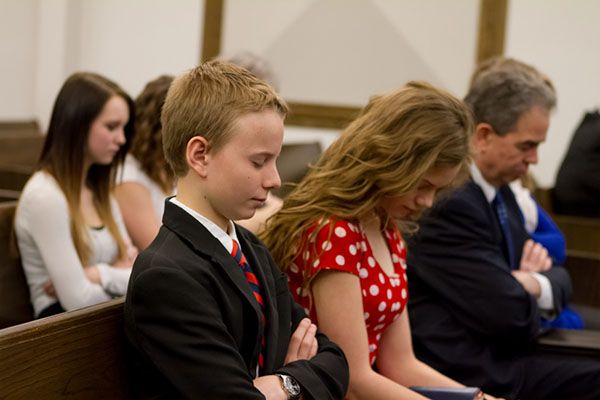How to Get the Most Out of Church
July 13, 2017 • Blog Post
Sunday is meant to be a day of worship, a day of spiritual replenishment and rest. But there are some times when those three hours of meetings feel like a chore, when the Spirit doesn’t seem to be getting through at all. It can feel like church isn’t working—at least not for you. So how can we bring meaning back into our meetings?
Whether you’re feeling down about church or you’re looking for ways to further enrich your church experience, these excerpts from BYU devotionals can aid in your pursuit of a fulfilling Sunday.
1. Open Your Heart
“The Lord’s kingdom ultimately must be found in our own hearts before it can be anywhere else. . . .
“. . . ‘The kingdom of God cometh not with observation: Neither shall they say, Lo here! or, lo there! for, behold, the kingdom of God is within you’ (Luke 17:20–21).
“So The Church of Jesus Christ of Latter-day Saints is in our heart of hearts, and, when it is in our hearts as individuals, it will also be in our great buildings of worship, in our great educational institutions, in our magnificent temples, and it will also be in our homes and families.”
—James E. Faust, “Where Is the Church?” 24 September 1989
2. Be Grateful
“A grateful heart is an important ingredient in becoming more teachable. . . .
“Choosing to have a grateful heart is an important strategy . . . because it prepares our hearts to be humble and open to the promptings of the Spirit.”
—Melissa Heath, “Becoming More Teachable,” 29 May 2012
3. Pray for Your Teachers
“You might . . . find a moment tonight to get in the proper place, perhaps alone, where you can pour out your heart. Among the things you will pray about, you might ask for a blessing on those who will teach you next Sunday. . . . Try to visualize where you will be and who will teach you. . . .
“You may not know who your Sunday School teacher or quorum teacher of Relief Society teacher will be next week, but . . . you can pray specifically that the Holy Ghost will come to them as they prepare to teach, and then come again as you sit at their feet to listen.”
—Henry B. Eyring, “Listen Together,” 4 September 1988
4. Arrive to Church Early
“We have noticed a growing trend in the Church . . . to arrive late at sacrament meeting, priesthood, and other meetings. . . . The ideal would be to arrive five or ten minutes early so you can sit in the chapel quietly listening to the prelude music and preparing yourselves to worship.”
—M. Russell Ballard, “Be Strong in the Lord, and in the Power of His Might,” 3 March 2002
5. Worshipfully Take the Sacrament
“In this meeting we partake of the sacrament and renew our covenants with the Lord. Moreover, we fast and pray and speak with one another concerning the welfare of our souls. Those who participate in this service properly and worshipfully conduct a quiet self-introspection centered around searching questions:
- Do I remember the Savior and the Atonement?
- Do I really love the Lord?
- Have I taken upon me the name of Christ?
- Am I keeping all of the commandments?
- Does the Holy Spirit abide with me?
- What can I do more to strengthen my faith, increase my devotion, and demonstrate my love and gratitude to deity?
“. . . Renewal and resolve should be uppermost in our minds as we partake of the sacrament.”
—Carlos E. Asay, “Spritual Checkups,” 21 August 1990
6. Be Reverent
“The importance of having a sense of the sacred is simply this—if one does not appreciate holy things, he will lose them. . . .
“. . . With a sense of the sacred, one grows in understanding and truth. The Holy Spirit becomes his frequent and then constant companion. More and more he will stand in holy places and be entrusted with holy things.”
—D. Todd Christofferson, “A Sense of the Sacred,” 7 November 2004
7. Take Notes
“Write down in a secure place the important things you learn from the Spirit. You will find that as you record a precious impression, often others will come that you would not have otherwise received. Also, the spiritual knowledge you gain will be available throughout your life. Always, day or night, wherever you are, whatever you are doing, seek to recognize and respond to the direction of the Spirit. Have available a piece of paper or a card to record such guidance.”
—Richard G. Scott, “To Learn and to Teach More Effectively,” 21 August 2007
8. Avoid Distraction
“We live in an extraordinary time when we have nearly unlimited access to information, entertainment, and other people. It is truly a blessing. But it can also be a curse. . . .
“So what exactly are we giving up when we submerge ourselves into our phones or other devices? What are we being drawn away from? . . . We are giving up those vital empty moments when we often and unintentionally learn about ourselves and receive spiritual promptings and other insights that only come in the space of absence from the noise in our lives.”
—David W. Hart, “Be Excellent: Becoming Who You Are in Today’s World,” 10 February 2015
9. Participate in Your Quorum or Relief Society
“Many people have the mistaken idea that a quorum or a Relief Society is merely a class or a place to sit during the third hour of church on Sunday. . . .
“The purposes of Relief Society are to increase faith and personal righteousness, strengthen families and homes, and seek out and provide relief for those who are in need. The quorum is to serve others, build unity and brotherhood, instruct quorum members in the doctrines and principles of the gospel, and watch over the Church. . . .
“Whatever our mortal experience, we can have this feeling of fellowship and have the support and strength of many around us. . . . It is in the sisterhood of Relief Society and the brotherhood of the quorums that we should find refuge and protection from the storms of life and the calamities of the latter days.”
—Julie B. Beck, “Why We Are Organized into Quorums and Relief Societies,” 17 January 2012
10. Act on What You Learn
“Theory is not enough. Experimenting is where theory meets reality. Doctrine remains theory in our minds until we show our belief in the doctrine by acting. . . .
“If we are not afraid, our life experiments can be tools to learn truth and to make changes.”
—Jennifer B. Nelson, “Experiment and Experience,” 3 March 2015




